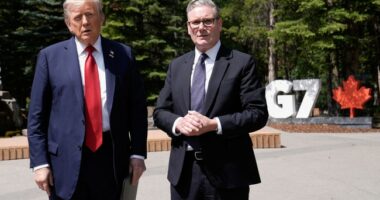In the two nearly identical letters, Trump said he takes particular issue with the trade deficits the US runs with both countries, meaning America buys more goods from there compared to the amount that American businesses export to those countries. Trump also said the tariffs would be set in response to other policies that he deems are impeding American goods from being sold abroad.

“Please understand that the 25% number is far less than what is needed to eliminate the Trade Deficit disparity we have with your Country,” Trump says in both letters.
He encouraged both countries to manufacture goods in the US to avoid tariffs.
“There will be no tariff” if South Korea or Japan or “companies within your Country, decide to build or manufacture product within the United States and, in fact, we will do everything possible to get approvals quickly, professionally, and routinely-In other words, in a matter of weeks”, he added.
Trump also threatened to raise tariffs higher than 25 per cent if South Korea or Japan retaliated against the US with tariffs of their own.
“If for any reason you decide to raise your Tariffs, then, whatever the number you choose to raise them by, will be added onto the 25% that we charge,” Trump also said.
Trump has threatened to send more letters out to heads of countries ahead of his looming 12.01am (2.01pm AEST) July 9 deadline for countries to make deals or face the threat of higher tariffs. That date marks the end of the pause on “reciprocal” tariffs, which briefly went into place in April.
Japan was set to face a 24 per cent tariff, while South Korea was set to face a 25 per cent tariff. Trump said these rates would be “separate from all Sectoral Tariffs”, meaning, for instance, cars from the two countries, which currently face 25 per cent tariffs, won’t be stacked on top of one another and charged a combined 50 per cent tax, the White House confirmed. That would apply to any future sector-specific tariffs, too, a White House official said.

Despite this, auto stocks of companies that have a heavy manufacturing presence in Japan and South Korea declined sharply. For instance, US-listed shares of Nissan Motors were down over 7 per cent, while Toyota and Honda shares were down 4 per cent.
Those declines, however, may reflect the increased likelihood of Trump potentially raising tariffs on cars from the two countries should they retaliate against the general 25 per cent tariffs, were they to go into effect, by slapping higher tariffs on American goods.
“These Tariffs may be modified, upward or downward, depending on our relationship with on our relationship with your Country. You will never be disappointed with The United States of America,” Trump ended the letters before signing off.
US stocks, which were already sliding, dropped lower after Trump’s announcement. The Dow was down as much as 530 points, or 1.2 per cent. The S&P 500 fell 0.87 per cent and the Nasdaq fell 0.9 per cent.






